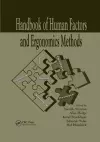
Handbook of Human Factors and Ergonomics Methods
5 contributors - Paperback
£62.99
Max Vercruyssen, PhD, is the director of Hawaii Academy, a private school for lifetime fitness, gymnastics, and human sciences, where he also serves as chair of the research department and as head coach of the school’s elitelevel trampoline gymnastics teams. For the past 15 years, Dr. Vercruyssen has reduced his research activities so that he and his wife, Dr. Donna Mah, could coach their four daughters in national and international championships.
He holds a bachelor’s degree in experimental psychology; master’s degrees in experimental and physiological psychology, exercise and sport sciences, and public health; a PhD in neuromuscular control, and pursued postdoctoral training to earn advanced certificates in ergonomics and gerontology. Most of his advanced statistics training was under Paul A. Games (Pennsylvania State University) and as required for experimental psychology, biostatistics, and longitudinal studies of aging.
At the University of Southern California (USC), Dr. Vercruyssen served as assistant professor of human factors and ergonomics, director of the Human Factors Laboratory, and codirector of the Laboratory of Attention and Motor Performance in the Andrus Gerontology Center. He also helped develop the university’s ergonomics graduate degree programs and mentored the first ergonomics majors in safety science. At the University of Hawaii, he was an associate professor in psychology, gerontology, and geriatric medicine.
During the 1990s, Dr. Vercruyssen was also a research associate at the University of Minnesota’s Center for Transportation Research, Institute of Intelligent Transportation Systems, and a distinguished fellow of gerontechnology at the Technical University of Eindhoven, Netherlands. Dr. Vercruyssen authored or coauthored over 200 refereed publications and presented papers at international scientific and technical conferences. Nine years of his university appointments involved teaching experimental research and statistics courses and mentoring thesis students (the practical need that resulted in developing this book). His students have received national research awards and his athletes have held many national and world championship titles. His current challenge is to make required statistics training palatable for students who may not enjoy or want to study mathematics—ven those with statistophobia—s well as for those with great ambitions for academic achievement.
Hal W. Hendrick, PhD, was emeritus professor of human factors and ergonomics at the University of Southern California. He held a BA in psychology from Ohio Wesleyan University, an MS in human factors, and a PhD in industrial psychology from Purdue University. Dr. Hendrick studied statistics and experimental design with APA Past President Professor Robert Perloff and Professor Ben Winer, the “guru” of behavioral research and analysis of his time. For six years, Dr. Hendrick developed and taught a course in statistics and experimental design at the United States Air Force Academy and for 19 years, a similar graduate-level course at USC.
Dr. Hendrick was a past chair of USC’s Human Factors Department, former executive director of the university’s Institute of Safety and Systems Management, and a former college dean at the University of Denver. He was a certified professional ergonomist, a diplomate of the American Board of Forensic Examiners, and a fellow of the American Psychological Society, the Human Factors and Ergonomics Society (HFES), the International Ergonomics Association (IEA), the American College of Forensic Examiners, and a charter member and fellow of the Association for Psychological Science. He was a past president of the Human Factors and Ergonomics Society, the International Ergonomics Association, the Foundation for Professional Ergonomics, and was a founding member and past president of the Board of Certification in Profession Ergonomics.
Dr. Hendrick was a recipient of USC’s highest award for teaching excellence, the IEA Distinguished Service Award, the HFES Arnold M. Small President’s Distinguished Service Award, the Jack A. Kraft Innovator Award, and the Alexander C. Williams, Jr. Design Award. Dr. Hendrick had over 45 years of experience as a human factors and ergonomics and industrial and organizational psychologist practitioner, educator, program administrator, and consultant. He was the author or coauthor of over 200 professional publications and three textbooks, and has edited or coedited 10 books, including the Handbook of Human Factors and Ergonomics Methods (CRC Press, 2005). Dr. Hendrick conceptualized and initiated the human factors subdiscipline of macroergonomics. He held a regular commission in the U.S. Air Force (Lt. Col., USAF ret). He and his wife, Mary, lived in Colorado and spent the winters in Hawaii.